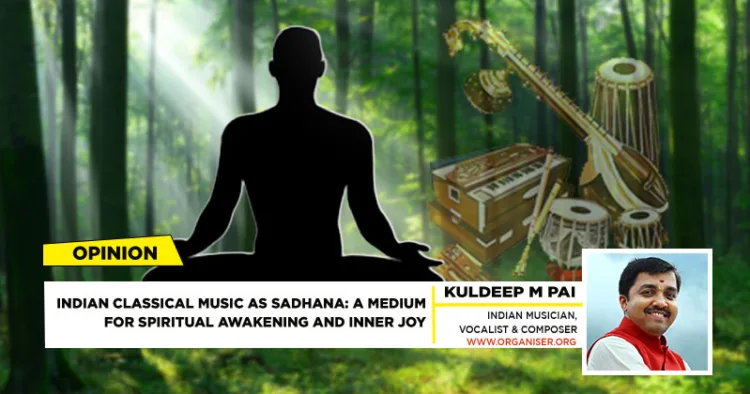The 64 Kalās, an ancient Indian classification of art forms, aptly places music at the forefront, underscoring its significance in the pursuit of spiritual excellence. The original purpose of music in this tradition is not merely to delight the senses but to elevate both the practitioner and listener to a higher plane of consciousness.
As musicians, have we truly explored the depths of music beyond technical proficiency? Do we merely focus on perfecting our craft, or do we strive to experience the transcendent essence of music? While listeners may be moved by our performances, can we, as musicians, honestly say that we have tapped into the ultimate joy that music has to offer?
Technical mastery is undoubtedly essential, but is it sufficient to convey the profound emotions and spiritual resonance that music is capable of evoking? Can we genuinely transmit the essence of music without having experienced its transformative power ourselves?
The question remains: Are we, as musicians, experiencing that “something beyond” – that elusive, intangible essence that elevates music from mere entertainment to a transcendent, spiritual experience? And, more importantly, are we able to convey that “something beyond” to our audience, inspiring them to experience it for themselves?
The answer lies in the subtle yet profound distinction between mere technical execution and “inspired expression”. When we, as musicians, connect with the music on a deeper level, we become vessels for the emotions, thoughts, and experiences that the music embodies. We transcend mere technicality and enter the realm of “inspired expression”. It is then that our music becomes imbued with a profound sense of purpose, passion, and spirituality. In this sacred space, our instruments, voices, and very being become conduits for the music’s transformative power, touching the hearts and souls of all who listen.
Maharshi Parashara’s timeless wisdom, as inscribed in the ‘Vishnupurana’, offers a profound insight:
tatkarma yanna bandhāya sā vidyā yā vimuktayē ।
āyāsāyāparaṃ karma vidyā’nyā śilpanaipuṇam ॥
Translated, this sloka reveals:
That is karma (action) which doesn’t lead to bandhana (bondage);
That is knowledge which leads to Moksha (liberation).
All other karmas (actions) are only waste of energy;
All other learning is mere craftsmanship.
In the context of music, this means that if our art form does not ultimately bestow upon us the highest freedom, it remains incomplete. When we create music solely for external validation – be it applause, accolades, or material rewards – we inadvertently reduce our art to mere craftsmanship. We become bound by the expectations of others, rather than allowing our music to be a pure expression of our inner selves. The pursuit of external happiness and recognition can lead us down a path of emptiness, leaving us feeling unfulfilled and disconnected from our true purpose.
However, when we approach music as a sacred ‘sadhana’, or spiritual practice, we open ourselves to the possibility of experiencing the sublime joy of liberation. We begin to see our music as a vehicle for self-realisation, a means of connecting with the Divine, and a way of sharing that connection with others. As we embark on this inner journey, our music transforms, becoming an instrument of spiritual growth, healing, and upliftment.
The lives and teachings of great composers like Tyagaraja Swami serve as shining examples of the transformative power of music. These Mahatmas have demonstrated that when music is approached with devotion, sincerity, and a deep connection to the Divine, it can become a potent catalyst for spiritual awakening. Their music continues to inspire and guide us, reminding us of the ultimate purpose of our art – to experience and share the bliss of ‘Mukti’ (liberation).
My heartfelt advice to young musicians: Don’t be seduced by the ephemeral validation of social media likes, dislikes, and love buttons. Nor should you be swayed by the approval of concert organizers or critics. These external measures of success are fleeting and transient. True art transcends all of these. Instead, utilize these mediums as precious tools to convey your deepest expressions, share your unique voice, and connect with kindred spirits. Remember, the true beauty of music lies not in external validation, but in the profound impact it can have on the human heart and soul!
May our music become an offering to the divine, a bridge that connects us to the infinite and the eternal. May our art form be a beacon of light, guiding us on the path to self-realization, liberation, and ultimate bliss.
In the words of the great Indian sage, Swami Haridas: “संगीत में जीवन का सार है” (Saṅgīt mēṅ jīvan kā sār hai) – “Music holds the essence of life.”
May we cherish, honour, and embody this timeless wisdom in our musical journey.






![A Representative image [ANI Photo]](https://organiser.org/wp-content/uploads/2025/12/representative-image-e1765612818961-120x70.webp)







Comments